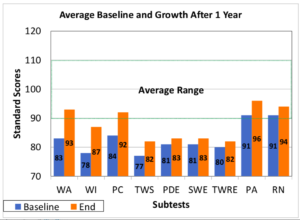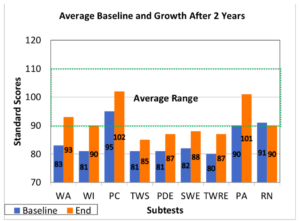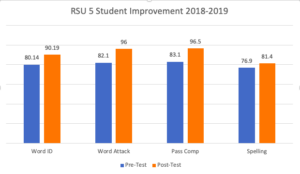In 1994 the Children’s Dyslexia Centers were established as a charitable function of the Scottish Rite of the Masonic Lodge in America. At that time the critical need for intervention in the lives of dyslexic children and their families was seen and met by the forward-looking people of that organization. Fast forwarding to the present, we are one of 42 centers in 15 states, each an independent entity reliant in part on Masonic support, but largely on their own fund-raising efforts. The vision for the future is for an association of independent, self-reliant Children’s Dyslexia Centers across the country.
The mission of the Portland Children’s Dyslexia Center is clear: we provide one-on-one instruction with a special reading approach for dyslexic children in grades 1-12. There is no charge to families for this essential service. Our Board of Governors works to ensure the quality and consistency of our programs, and is constantly looking for ways to broaden the scope of this mission.
Specially trained tutors using the Orton-Gillingham model help our students overcome the unique perceptual challenges common to dyslexia. This teaching approach is not generally in use in the public schools, where dyslexic children often fall behind. We also train these tutors in this special approach, to keep our system operating smoothly into the future.
Our goal is to see that no child falls behind because of their unique gift called dyslexia. Dyslexic people are known to be intuitive, creative and persistent. But without early reading skills, many will not achieve the promise of their potential. This is where we come in. The Portland Children’s Dyslexia Center works every day to make sure this can happen.
WHAT IS DYSLEXIA?
Dyslexia is a neurological learning disability that makes it difficult for children and adults to read, write and spell. It affects up to one out of every five people and affects boys and girls equally.
Children left with untreated dyslexia often suffer devastating personal consequences and are more likely than their nondyslexic peers to drop out of high school. Research reveals that children with untreated dyslexia can become underachieving adults unable to contribute to society at their fullest capacity.
OUR APPROACH
What is Orton-Gillingham?
The Orton-Gillingham approach to reading instruction is a framework developed in the 1920s and 30s by Samuel Torrey Orton and Anna Gillingham. This structured and multi- sensory approach helps students to break down words into individual letters and sounds, learn the relationship between the sounds and their symbols, and then build on this information while exploring blends, spelling rules, prefixes and suffixes, and language roots. The multi-sensory aspect of the approach encourages students to explore letters and words through multiple senses - for example, a student might see a word written on an index card, hear the word as they read it aloud, and feel the word as they write it in sand or shaving cream. This approach is effective with most learners, and is especially helpful for dyslexic learners.
"We love the dyslexia program and Orton-Gillingham...it has saved Liam's LIFE!
Not an exaggeration!"
- Lindsey M
Year over year, our students consistently make significant gains with the Orton-Gillingham approach. Whether teachers are trained at our Center, or in their own school district, student performance improves at the same rate. Click here for more detail on our Student Progress Summary.



Board of Governors
Reuben Bell
Chairman
I am fairly new to the Board of Governors of the Portland Children’s Dyslexia Center, having discovered the Center in 2017. I couldn’t believe what I had found. Here was a place where children who cannot read the way they are taught in school, can learn to read their way, because their way is very different from the other way. But not all children can or do. 20% of American children exhibit some degree of dyslexia. This number is very large. Only a small number of these will find their way into the specialized teaching format we use here at the Portland Center. Many of the rest will fall behind in reading, in math, in social skills, and eventually in life. It’s true. Some will find their own way, swimming upstream against the current of conformity. I managed to do just that, but not without some interesting circumstances; dyslexia was not such a known entity when I was in school.
But that is all different now. Dyslexia is no longer a little-known thing. Research and practice have brought it out of obscurity and put it into the middle of the neighborhood where it belongs.
Having discovered what the Portland Children’s Dyslexia Center does, I was very excited to become the Chairman of our Board of Governors, to do what I can to help this small but so very important organization grow and thrive. We teach the teachers who teach the children. And then they teach the children. I wish you could see the faces of our kids as they come out of their shells and move to the head of the class. It is an honor to be a part of the Portland Children’s Dyslexia Center. I urge you to find out more about us, and become a friend and supporter.
Reuben Bell, Chairman
Jane Hunt, Vice Chair
John Bond, Sr.
Donald Cyr
Josie Dupal
Robert Ferguson
Nancy Greenblatt
Bradford Blake, Secretary
Brian Wolcott, Treasurer
Ward Grossman
Lee Hapworth
Andy Nightingale
Steve Raymo
Lisa Whitis
Facebook Fundraisers
Did you know that when you donate on facebook, there are zero processing fees? We receive 100% of your donation. You can create a facebook fundraiser anytime directly from our facebook page. We are grateful for everyone who celebrates their birthday, graduation, Giving Tuesday, etc. by fundraising with their friends!
AmazonSmile
Visit smile.amazon.com . If this is your first visit, you will be asked to select the charity you wish to support. Enter “Portland Children’s Dyslexia Foundation.” If you wish to change your charity to support us, simply select “Change Your Charity” in “Your Account.” Log into your Smile account every time you shop with Amazon, and The AmazonSmile Foundation will donate 0.5% of the purchase price from your eligible AmazonSmile purchases. It all adds up!
Events
We host a variety of events including a Silent Auction in the fall, the Dash for Dyslexia in the spring, restaurant nights, etc.
Volunteer Opportunities
Help us plan and promote fundraising events, or help at our events to ensure that things run smoothly. Contact Emily emily@dyslexiacenterportland.org for more information
HOWEVER
We know that more than half of our 3rd graders are not meeting literacy expectations. We know that many of those students are dyslexic, and that most of them are not being identified. However, we also know that early identification is possible and highly accurate - we can identify dyslexia before allowing students to experience years of failure. Early intervention is a cost effective approach to public education, secondary education, and arguably other, longer-term community resources like public safety.
Your educated voice on this topic can make a difference with local schools, legislators, the Department of Education, etc. Help us spread the word that universal screening for incoming kindergartners and teacher training in Orton-Gillingham will help turn this trend into a Maine success story!








